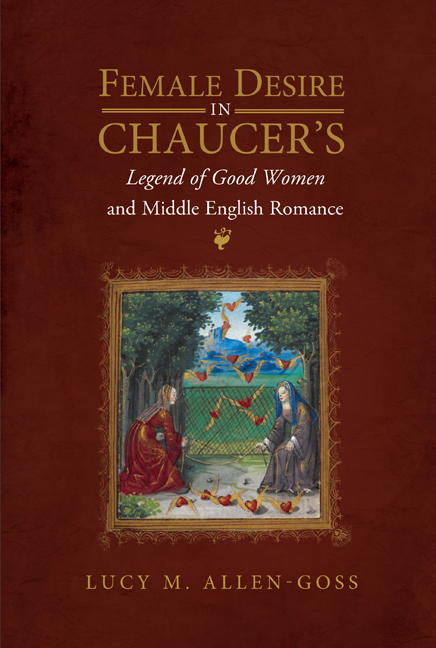Book contents
- Frontmatter
- Contents
- Acknowledgements
- Abbreviations
- Author’s Note
- Introduction: The Origins of Female Desire
- 1 The Silencing of Female Desire in the ‘Legend of Philomela’
- 2 The Traumatised Narrative of the Alliterative Morte Arthure
- 3 ‘As Matter Appetiteth Form’: Desire and Reciprocation in the ‘Legend of Hipsiphyle and Medea’
- 4 Stony Femininity and the Limits of Desire in The Sowdone of Babylon
- 5 Veiled Interpretations and Architectures of Desire in the ‘Legend of Thisbe’ and the ‘Legend of Ariadne’
- 6 Opening Mechanisms, Enclosing Desire: The Erotic Aesthetics of Undo Your Door
- Conclusion: The Ends of Desire
- Bibliography
- Index
- GENDER IN THE MIDDLE AGES
2 - The Traumatised Narrative of the Alliterative Morte Arthure
Published online by Cambridge University Press: 16 September 2020
- Frontmatter
- Contents
- Acknowledgements
- Abbreviations
- Author’s Note
- Introduction: The Origins of Female Desire
- 1 The Silencing of Female Desire in the ‘Legend of Philomela’
- 2 The Traumatised Narrative of the Alliterative Morte Arthure
- 3 ‘As Matter Appetiteth Form’: Desire and Reciprocation in the ‘Legend of Hipsiphyle and Medea’
- 4 Stony Femininity and the Limits of Desire in The Sowdone of Babylon
- 5 Veiled Interpretations and Architectures of Desire in the ‘Legend of Thisbe’ and the ‘Legend of Ariadne’
- 6 Opening Mechanisms, Enclosing Desire: The Erotic Aesthetics of Undo Your Door
- Conclusion: The Ends of Desire
- Bibliography
- Index
- GENDER IN THE MIDDLE AGES
Summary
The violent silencing of female desire that lies at the heart of Chaucer’s ‘Legend of Philomela’ also pervades the romance that is the subject of this chapter: the alliterative Morte Arthure. I argue that, like the Legend, this romance presents two almost equally unappealing possibilities: the first, that female desire is simply irrelevant to a poetics founded on rape; the second, that any attempt to articulate or depict female desire must result in sodomitic disruptions to the poetic, narrative and linguistic structures of the text. Written around 1400, the alliterative Morte concentrates upon that most enduringly popular subject of romance: the Matter of Britain and the exploits of King Arthur. Rooted in the chronicles of Geoffrey of Monmouth, Layamon and Wace, the poem is permeated by military and political concerns, European campaigns and set-piece jousts, treachery and usurpation and civil war. Women rarely feature, and scenes of love or desire between men and women are entirely absent. Yet I argue that a brutal rape, early in the text, holds the key to the poem's strangely repetitive structure and odd outbreaks of mingled innuendo and emotion. Drawing on work in trauma theory, I read the Morte as a ‘traumatised narrative’, a narrative whose structure responds to the ‘forgotten wound’ of the rape, which is repeatedly re-performed through scenes of jarring, comedic or parodic episodes of violence and intimacy between men. As with the ‘Legend of Philomela’, this displaced representation of silenced female suffering brings coherence to seemingly dissonant, fragmented, repetitive and structurally disarticulated aspects of the poem. The Morte thus exemplifies the dynamic we will find in other late medieval English romances. It makes space for the expression of female emotions within and through masculine bodies, yet in so doing, it constructs a hermeneutic wherein female emotion is legible only as it takes on the visible contours of sodomitic masculine desire.
EVERYWHERE AND NOWHERE: FORGETTING RAPE IN THE ALLITERATIVE MORTE ARTHURE
The alliterative Morte Arthure is one of several Middle English treatments of the narrative of the death of King Arthur, following the many Latin and French texts that told and retold the famous story.
- Type
- Chapter
- Information
- Publisher: Boydell & BrewerPrint publication year: 2020



